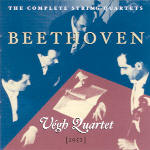Hot on the heels of Naïve-Astrée’s budget reissue of the Vegh Quartet’s 1972-74 Beethoven cycle comes another powerful contender: no less than the Vegh Quartet itself, 20 years earlier! The group’s 1952 Beethoven cycle first appeared on LP in the U.S. on the Haydn Society label, while some collectors may have encountered its rare Japanese EMI CD incarnation. Music and Arts now offers the recordings in a space-saving box at the cost of seven discs for the price of four. They sound better than ever via Maggi Payne’s sensitive remastering work. Payne shaves the strident edges off the dryish sonics while retaining the full spectrum of color, overtones, nuance, and what annotator Harris Goldsmith aptly describes as the ensemble’s “pyramid-like” tonal balance. I gather that the latter refers to the definition and sense of direction the listener infers from the bass lines, regardless of tempo.
Moreover, like the Talich Quartet (and quite unlike the Lindsays recent remakes) the Veghs do not sacrifice sonority for speed, yet tone quality never seems to be an end in itself as is sometimes the case with the Quartetto Italiano’s late Beethoven. The Veghs, for instance, deploy vibrato with the utmost discretion and specificity, most tellingly in slow movements. This particularly applies to first violinist Sandor Vegh whose timbre proves more lustrous and intonationally centered here than in the stereo remakes.
My favorite items include the Veghs’ superbly characterized and musicianly Op. 18 and Op. 59 traversals. The foursome may not tackle Beethoven’s precipitous metronome markings head on in the C major Razumovsky’s fugal finale, yet its rhythmic control and variety of articulation generate more cumulative tension and drama than the brisker but more tonally monochrome Juilliard and Emerson versions. A hauntingly shaded Op. 132 boasts a plainspoken, unmilked-to-death, and very moving Heiliger Dankgesang, where Georges Janzer’s viola takes on a spooky, clarinetish hue not repeated 20 years later. Goldsmith’s aforementioned notes (brilliantly written and contextually informative, by the way) accurately cite the ensemble’s unorthodox tempo relationships in Op. 127’s Finale and the Grosse Fuge, although I hear no heaviness or stolidity in the Op. 74 Scherzo. In sum, this is an enticing bargain for chamber music aficionados and a provocative supplementary edition to acquire alongside the above-listed Beethoven Quartet reference versions.
































